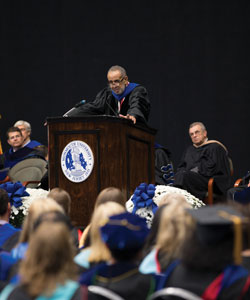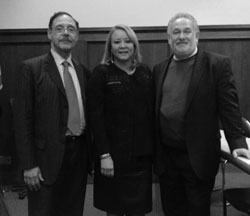The annual Founder’s Day Convocation was held in commemoration of the 50th anniversary of Dr. Martin Luther King, Jr.’s visit to Monmouth College in 1966. The ceremony was located in the OceanFirst Bank Center on Wednesday, Oct. 5.
On the day of the ceremony, nearly 300 faculty and administrators flocked toward the Center in a rainbow of academic regalia, along with students and other members of the University community.
Created in 1983 on the University’s 50th anniversary from a junior college to an established institution of higher education, Founder’s Day is an annual celebration of the University’s founding in 1933.
Three decades after Monmouth College opened its doors, King was invited to speak by the Black Student Union in their annual lecture series. Just 18 months before he was assassinated, King stood in front of a packed audience in Boylan Gymnasium on Oct. 6, 1966. To the audience he said, “It seems to me that if a nation can spend that much money on a war in Vietnam and it can spend $20 billion to put a man on the moon, it can spend billions of dollars to place God’s children on their own two feet here on earth.”
This year’s convocation address was delivered by Reverend Gilbert Caldwell, who marched alongside King and was an activist in the Civil Rights Movement.
Caldwell’s Founder’s Day address came after a number of speeches and opend with a harmonious rendition of “God Bless America” by the University’s Chamber and Concert Choruses under the direction of David Tripold, a professor of music and theater arts.
 University President Paul R. Brown, Ph.D. officiated the start of the convocation with a welcome speech. Before beginning, he called for a moment of silence to recognize the recent loss of Jules L. Plangere, a long standing benefactor and friend of the University.
University President Paul R. Brown, Ph.D. officiated the start of the convocation with a welcome speech. Before beginning, he called for a moment of silence to recognize the recent loss of Jules L. Plangere, a long standing benefactor and friend of the University.
Brown went on to address the sea of faculty members in attendance. “As we gather today it is important to reaffirm our strong commitment to personalized education, and personal development. We celebrate the scholarship of our faculty, and their essential role in the success of our educational mission,” said Brown.
“Just as in 1933 the passion and dedication of all faculty remains the first and foremost ingredient to providing an education that will open new pathways for intellectual development, and new doors to post-graduate success. Our faculty are at the core of this enterprise,” Brown added.
Henry Mercer III, Chair of the Board of Trustees, preceded Brown and gave a speech that painted the historical context behind King’s visit. “Many momentous and important milestones happened during the past 83 years, so it is the theme of today’s celebration which takes us back to the year 1966 when one of Monmouth’s most historical events took place right here. The student union in its annual culture lecture series chose as its first speaker that year, Dr. Martin Luther King, Jr.,” said Mercer.
“The social climate in our country was divisive. Not only in the struggle for equality and civil rights but also in the unrest of an increasingly unpopular Vietnam War. It was in this climate that a 37 year old Dr. King, having just two years before been awarded the Nobel Peace Prize, came to speak to an almost entirely all white audience, not all of whom were receptive to his ideals,” Mercer continued.
Austin Skelton, President of the Student Government Association (SGA), followed Mercer with a speech that thanked faculty, staff, administrators, and student leaders in the audience for contributing to “Monmouth’s diverse inclusive, and immersive atmosphere.”
Afterwards, Brown returned to the podium to give his presidential address. He said, “We have continued to honor Dr. King’s memory and recognize his visit to Monmouth decades after decade, because his visit was transformative. He changed the minds of the audience in Boylan Gym, 50 years ago. He changed the evolution of the college that was for all practical purposes only 10 years old in 1966. And he changed the course of the national dialogue, a national dialogue that we continue today.”
Finally, Caldwell approached the podium and began by commending the bravery showcased by those who brought King to Monmouth College in 1966. “The courage of those who invited Dr. King to speak must be applauded. Not every institution of higher education would have dared to invite the one who was called by Vincent Harding, ‘The Inconvenient Prophet,’ 50 years ago. In addition to his commitment to racial justice, he was an outspoken opponent of the war in Vietnam, a supporter of the independence of African countries, and an advocate of economic justice through the Poor People’s Campaign,” said Caldwell.
Caldwell went on to explain what it was like growing up in an era of legal segregation. He and his wife, Grace Caldwell, were both discriminated against by colleges and other establishments. He said, “I spent summers in Atlantic City earning money for my college tuition. I worked in restaurants where I could not eat as a customer, and in hotels where I could not speak as a guest.”
He concluded with a final call to action. “Monmouth University you have much to be proud of but there is still justice work to be done. May Founders Day be a day of renewal for the good you have done and are doing. And may you as an institution in response to Martin Luther King, become a drum major for Justice University,” he said.
The ceremony ended with the singing of the alma mater, and a hymn by the Monmouth University Chamber Orchestra.
Attendees were invited to the reception on the second floor of the OceanFirst Bank. Refreshments were served, and a recording of Dr. King’s speech was presented alongside large posters of King and Caldwell in the sixties.
Claude Taylor, a transformative learning and faculty professor in the Department of Communication, attended the reception. He greatly appreciated the words shared by Caldwell. “It was a real gift to have him here to share that message. He accurately pointed out that we as a culture can’t continue to look away. There are real problems at several levels of the society, many of them tied to race, and we have to confront them,” said Taylor.
“For Monmouth it was a really direct message that more has to be done on issues that are difficult to talk about, and tough to manage,” Taylor continued. “We have an obligation, to deal with the positive and the negative,” he continued.
After the ceremony Brianna Golden, a senior political science and Spanish student, wondered what King would say if he were alive to comment on the progress of the University since his speech fifty years ago. She said, “I think if Dr. King were here today he would talk about what unity looks like, and tell students to look past racial differences, and continue to stand for one another.”
PHOTO COURTESY of Tina Colella
IMAGE TAKEN from APP.COM




